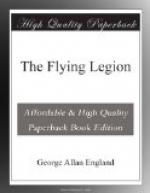A web, they all felt, was closing about them that only chance and boldness could unravel. Everything now hung on the word of an aged fanatic, who for any fancied breach of the Oath of Salt might deliver them to slavery, torture, death.
“Remember, men,” the Master warned his men as they penetrated the dim, golden-walled passage also lighted with sandal-oil mash’als—“remember the mercy-bullets. If it comes to war, none of us must be taken prisoner!”
To the Olema he exclaimed, in suave tones:
“Dakhilak, Ya Shayk! (Under thy protection, O Sheik!) Let not the laws of hospitality or the Oath of Salt be forgotten!”
The Olema only smiled oddly, in the dim and perfumed obscurity of the passageway, along which the slither of the many sandaled feet on the gold pavement made a soft, creeping sound. Nothing more was said—except for some grumbled mouthings of Bohannan—during the next few minutes.
The passage seemed enormously long to the Master as, flanked by Leclair, “Captain Alden,” and the major, he peered curiously at its smooth, dull-yellow walls all chased with geometrical patterns picked out in silver and copper, between the dull-hued tapestries, and banded with long extracts from the Koran inlaid in Tumar characters of mother-of-pearl.
Several turnings, and three flights of steps descending through the solid gold “dyke” that ran down into the bowels of the earth no one could even guess how far, served still more to confuse the Legionaries’ sense of direction and to increase their conviction that, in case of any outbreak of hostilities, they would find themselves trapped more helplessly than rats in a cage.
It is no aspersion on their bravery to say that more than one among them had already begun inwardly to curse this wild-goose chase into Jannati Shahr. It all had now begun to assume absolutely the appearance of a well-formulated plan of treachery. Even the Master gave recognition to this appearance, by saying again: “Be ready for a quick draw. But whatever you do, don’t be the aggressor. Watch your step!”
The passage suddenly reached its end. Another heavy door of the yellow metal swung back, and all issued into a hall even more vast than the one they had quitted.
No windows here admitted light. The air, though pure enough as from some hidden source of ventilation, hung dead and heavy. Not even the censers, depending from the dim roof, far above, could freshen it; nor could the cressets’ light make more than a kind of ghostly aura through the gloom.
By this dim half-illumination the Master beheld, there before him in the middle of the tremendous golden pavement, a strange, pyramidal object rising four-square in the shape of an equilateral triangle—just such a triangle as was formed by the locations of Mecca, Bab el Mandeb, and El Barr.
This pyramid, polished and elaborately engraved, towered some ninety feet above the floor. It was pierced by numbers of openings, like the entrances to galleries; and up the smooth face nearest the entrance to the hall, a stairway about ten feet wide mounted toward the apex.




